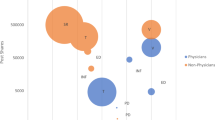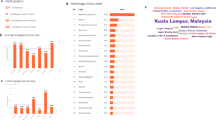Abstract
Background
The quality of prostate cancer (PCa) content on Instagram is unknown.
Methods
We examined 62 still-images and 64 video Instagram posts using #prostatecancer on 5/18/20. Results were assessed with validated tools.
Results
Most content focused on raising awareness or sharing patient stories (46%); only 9% was created by physicians. 90% of content was low-to-moderate quality and most was understandable, but actionability was 0%. Of the 30% of content including objective information, 40% contained significant misinformation. Most posts had comments offering social support.
Conclusions
Instagram is a source of understandable PCa content and social support; however, information was poorly actionable and had some misinformation.
This is a preview of subscription content, access via your institution
Access options
Subscribe to this journal
Receive 4 print issues and online access
$259.00 per year
only $64.75 per issue
Buy this article
- Purchase on Springer Link
- Instant access to full article PDF
Prices may be subject to local taxes which are calculated during checkout

Similar content being viewed by others
Availability of data and materials
All research data are publicly available through Instagram.
References
Struck JP, Siegel F, Kramer MW, Tsaur I, Heidenreich A, Haferkamp A, et al. Substantial utilization of Facebook, Twitter, YouTube, and Instagram in the prostate cancer community. World J Urol 2018;36:1241–6. https://doi.org/10.1007/s00345-018-2254-2. Epub 2018 Mar 9. PMID: 29523948.
Loeb S, Sengupta S, Butaney M, Macaluso JN Jr., Czarniecki SW, Robbins R, et al. Dissemination of misinformative and biased information about prostate cancer on YouTube. Eur Urol. 2019;75:564–7.
Xu AJ, Taylor J, Gao T, Mihalcea R, Perez-Rosas V, Loeb S. TikTok and prostate cancer: misinformation and quality of information using validated questionnaires. BJU Int. 2021. https://doi.org/10.1111/bju.15403. Epub ahead of print. PMID: 33811424.
Borno HT, Zhang S, Bakke B, Bell A, Zuniga K, Li P, et al. Racial disparities and online health information: YouTube and prostate cancer clinical trials. BJU Int. 2020;126(1):11–13.
Myers T, Richardson F, Chung JE. Racial and ethnic makeup in hospital’s social media and online platforms: visual representation of diversity in images and videos of Washington, D.C. Hospitals. J Health Commun. 2019;24:482–91. https://doi.org/10.1080/10810730.2019.1617807
DISCERN Online. Quality criteria for consumer health information. www.discern.org.uk/index.php. Accessed 15 Aug 2021.
Agency for Healthcare Research and Quality. The Patient Education Materials Assessment Tool (PEMAT) and user’s guide. https://www.ahrq.gov/health-literacy/patient-education/pemat.html. Accessed 15 Aug 2021.
Da Silva RD, Leow JJ, Abidin ZA, Linden-Castro E, Castro EIB, Blanco LT, et al. Social media in the urology practice | Opinion: no. Int Braz J Urol. 2019;45:882–8. https://doi.org/10.1590/S1677-5538.IBJU.2019.05.04. PMID: 31626517; PMCID: PMC6844338.
Loeb S, Carrick T, Frey C, Titus T. Increasing social media use in urology: 2017 American Urological Association Survey. Eur Urol Focus. 2020;6:605–8. https://doi.org/10.1016/j.euf.2019.07.004. Epub 2019 Jul 24. PMID: 31351900
Pew Research Center Social Medial Fact Sheet. https://www.pewresearch.org/internet/fact-sheet/social-media/. Accessed 21 Sep 2021.
Funding
SL: Prostate Cancer Foundation, Health Disparity Research Award from the Department of Defense.
Author information
Authors and Affiliations
Contributions
AX gathered and analyzed data, wrote and revised manuscript; JT analyzed data, revised manuscript; RM revised manuscript; TG, VP, RM gathered source data; SL conceptualized the study and reviewed the manuscript
Corresponding author
Ethics declarations
Competing interests
The authors declare no competing interests.
Additional information
Publisher’s note Springer Nature remains neutral with regard to jurisdictional claims in published maps and institutional affiliations.
Supplementary information
Rights and permissions
About this article
Cite this article
Xu, A.J., Myrie, A., Taylor, J.I. et al. Instagram and prostate cancer: using validated instruments to assess the quality of information on social media. Prostate Cancer Prostatic Dis 25, 791–793 (2022). https://doi.org/10.1038/s41391-021-00473-7
Received:
Revised:
Accepted:
Published:
Issue Date:
DOI: https://doi.org/10.1038/s41391-021-00473-7



